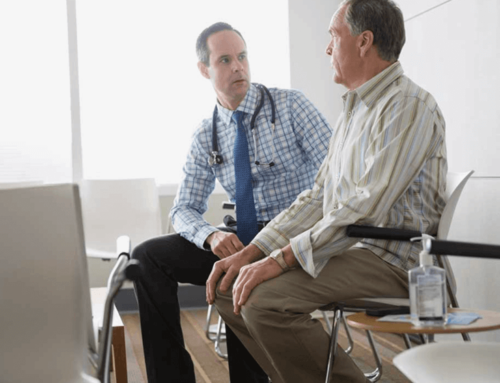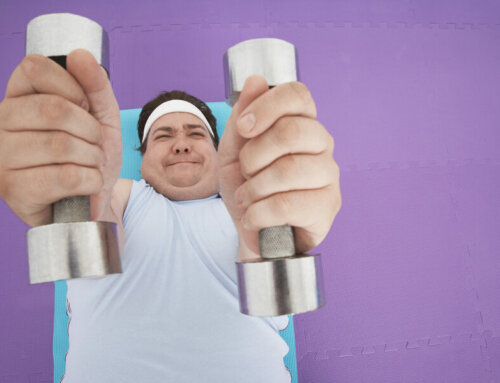
Beyond the PAP Smear.
What is a Well Woman Exam? Why do I need a Well Woman Exam? What is the purpose of a Well Woman Exam?
Many women feel that a well woman exam is all about the PAP smear. This statement is far from the truth at our practice. In fact, it is a mere fraction of the visit.
Below, I will list the basic categories of a well woman exam, and you will understand why these exams are extremely important to your wellbeing and overall health. As you read this article, you should analyze your previous visits with other doctors. Ask yourself – did this get checked at my last physical? When I had my PAP smear, did my physician discuss my vaccination status? Did the healthcare provider do a thorough exam of my heart and lungs instead of only focusing on my female parts?

Woman doctor feeling woman’s tonsils
Past Medical History: A full evaluation of your past medical history is important as it directs your healthcare provider to order the right tests for you. If you have high blood pressure and microscopic protein in your urine, you will need a kidney ultrasound. Many illnesses are common including irregular periods and acne, but certain combinations of medical problems should trigger your physician to think of a larger problem that may be causing both issues. These combinations may not have been considered when you came in for a sick visit. During your well visit, the physician can think about your overall wellness, and they may discover that you actually have PCOS (Polycystic Ovarian Disease) that is causing your acne and irregular periods.
Family History: You have 3 relatives with cancer? We should talk about this in more detail and consider genetic testing. Or, you have had several family members who have died from ruptured brain aneurysms? We should talk about whether you need an MRI to screen you for the aneurysm before you suffer the same fate. You share many genes with your family members – an in depth assessment should be made at each well woman exam. After all, new illnesses and diseases arise over time in your family, and we need to be aware of any changes. You may not qualify for breast cancer genetic testing now, but if your sister gets diagnosed with breast cancer at age 48, you should certainly get tested.
Tobacco Use: Any tobacco use has terrible consequences that most people already know about. Your cancer risk across the board is 3-5 times more likely than the general population. Your risk of lung disease is inevitable if you live long enough, and your risk of heart attack and stroke are double that of a non-smoker. Moreover, your skin ages twice as quickly. When you’re 40, you will look 60. Don’t believe me? Look around. Quit smoking, dipping, or any other form of tobacco. If you need help quitting, ask us!
Physical Exam: The physical exam is an important component of a well woman exam as you may not have noticed that skin growth on your neck. Your liver seems enlarged on your abdominal exam, or your heart has an irregular beat that may signal a higher risk of stroke (atrial fibrillation). The pelvic exam is also an important component to your well woman exam. The PAP smear guidelines have changed, and PAP smears are being done less often. However, if ovarian cancer runs in the family, your healthcare provider should continue doing exams and checking for enlargements in your lower abdomen even if you do not need a PAP smear. If your legs are swelling, it may be a sign of weakening heart muscle or a floppy heart valve.
Cardiovascular Risk Assessment and Evaluation: Although many components of your well woman exam are important, your cardiovascular risk assessment is the most important. Why? The number one killer of women is STILL heart disease. Your risks for heart disease can be easily detected and reduced with advanced cholesterol testing, in-depth blood sugar metabolism, blood vessel assessment (Max Pulse), Carotid IMT scoring, and Cardiometabolic Exercise Stress Testing (CMET). You should not let another year go by without adequate testing performed.
Vitamin and Nutritional Assessment: Vitamin levels and nutrition will be discussed and tested at your visit to ensure optimal energy levels and immune system support. We will check Vitamin D, B12, Folate, Nitric Oxide and other important vitamins and nutrients. We can also discuss weight loss options. We also have a dietician in office that is covered by your insurance for nutritional counseling. See her profile in our Meet the Staff section.
Hormone balance / Birth Control: An important part of your identity as a female is based on your hormonal balance. We encourage women to start Bioidentical Hormone Replacement if they desire hormone balance. We can test your hormone levels to assess for perimenopause, menopause, PCOS, and other hormonal imbalances. This testing is covered by insurance. For our younger females, we offer many different forms of birth control, including the new long-term birth control options of Nexplanon, Paragard, Mirena, and Skyla. We can also help balance your hormones for heavy periods, irritability, or mood instability around your periods (PMS).
Cancer Screening: We routinely discuss cancer prevention, detection, and testing. We suggest whole body skin checks on certain skin types since skin cancer is the most common form of cancer. We routinely discuss your colorectal cancer screening, which can be done via colonoscopy or stool blood testing. We also discuss mammography for breast cancer risk although this has been under considerable controversy recently (see my previous blog on the Harms of Mammography). Lung cancer screening via CT Scan (or CAT Scan) is indicated for women who smoke or recently quit. Cervical cancer is evaluated via PAP smear, and we evaluate your PAP smear for the presence of the HPV virus. If your cervix carries the HPV virus, then you are in a higher risk category of cervical cancer. Our office can take your HPV virus testing to the next level by analyzing which specific HPV virus genotype that you carry. There are 3 HPV viruses that cause 85% of all cervical cancers, and we can determine if you carry any of those 3 viruses. Finally, ovarian and uterine cancers are evaluated by careful questioning, pelvic examination, and ultrasound (if needed).
Vaccination Status: Are you up to date on your Tetanus shot? Did you get the Whooping Cough boost with your last Tetanus shot? Are you eligible for the Shingles Vaccine (Zostavax)? Are you at higher risk of developing pneumonia because you have asthma or smoke? Then, you need the Pneumovax. Do you routinely travel outside of the country? Then, you should begin your Hepatitis A and B vaccines. Are you eligible for the HPV vaccine (Guardasil)? In the future, women who have received the complete Guardasil vaccine series may not even need PAP smears because their cervical cancer risk is determined to be low.
Bone Density: Are your bones strong enough? Is that next stumble across the pavement going to cause a hip fracture? Thin bones, or osteoporosis, often go undetected when not being checked regularly. After all, it has no symptoms until a bone is broken, and hip fractures are a leading cause of death in the elderly. The hip fracture itself is not fatal, but when an elderly person is hospitalized, their risk of fatal infections increases dramatically. In addition, recovering from a hip fracture requires months of physical therapy and usually patients are admitted to a nursing home temporarily. Bone density testing can be done in the office quickly and painlessly with less radiation than the sun emits.
There are many aspects of a well woman exam that go beyond the PAP Smear. Please be sure that whomever is performing your well woman exams is doing a thorough job. You only get 1 body – you better take care of it. My final message will be from my soapbox.
[My Soapbox] As you can see, there are many things to discuss in a brief amount of time at your well woman exam. A big mistake that many patients make is bringing a “list” of questions and issues that detract from the wellness portion of your visit. Some questions are expected and helpful, but please remember to keep your “wellness” the priority of the visit. If you expect to discuss that fleeting arm pain that happens once a month and lasts for seconds, then you cannot expect to cover every aspect of your wellness in detail. Your visit time is limited. Do not waste precious minutes on problems that could be discussed at a separate problem-oriented visit. Your wellness is important to your long-term health and wellbeing. [End Soapbox]
#PAP #PAPSmear #WellWoman #Wellness





